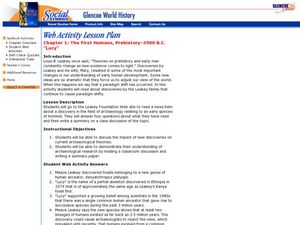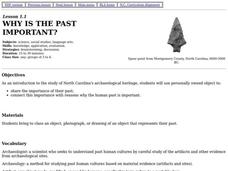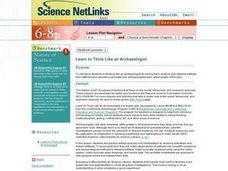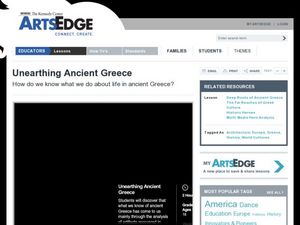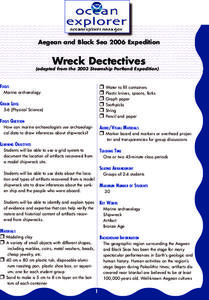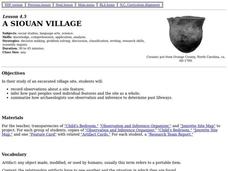Curated OER
World History: Why Civilizations Fall
Young scholars examine factors leading to the demise of ancient civilizations. They list causes that led to the downfall of these societies. Students conduct Internet research and participate in online archaeological investigations.
Curated OER
The Ancient Cliff Dwellers of Mesa Verde
Students research evidence discovered during Mesa Verde archaeological dig, view images of ancient artifacts, simultate real dig and reconstruct items buried on school grounds, and create newsletter or video tape skit.
Curated OER
The First Humans: Prehistory-3500 B.C. "Lucy"
Learners explore prehistoric times by completing web activities in class. In this human ancestry lesson plan, students identify the archaeological discovery of the "Lucy" skeleton and what it meant for science. Learners investigate the...
Curated OER
We Arrived 10,000 Years Ago...
Students explain ways that humans migrated from Asia and settle in the Americas. In this investigative lesson students participate in a brief archaeological demonstration and review what they learned.
Curated OER
Utah Archaeology
Students study past cultures of those who made areas of Utah their home by exploring the artifacts these cultures left behind. Students will explore different types of fossils and learn that fossils are evidences of past life.
Curated OER
"Adding It Up" at James Fort
Young scholars discuss jettons and their archaeological importance at Jamestown. They then practice using historic counting sheets and artifacts to understand the calculating methods of the early 17th Century, and identify their...
Curated OER
Why is the Past Important?
Fourth graders discuss the importance of North Carolina's archaeological heritage. They share with the class an object, photograph, or drawing of an object that represents their own or their family's past.
Curated OER
UMNH: Cultural Clutter - Tales In The Trash
Fourth graders list three or more types of evidence of prehistoric cultures that encouraged archaeologists to investigate the marshes around the Great Salt Lake. They also explain why it is important not to disturb archaeological remains.
Curated OER
Stratigraphy and Cross-Dating
Pupils interpret archaeological strata using the law of superposition. They apply cross-dating to determine the age of other artifacts.
Curated OER
Chronology: They Time of My Life
Students demonstrate the importance of intact information to achieve accuracy. They compare and constrast their timelines with the chronological information contained in a stratified archaeological site.
Curated OER
Utah Archaeology
Students use Play-dough explore different types of fossils and examine how fossils are evidences of past life.
Curated OER
Leaarn to Think Like an Archaeologist
Students examine how to act as archaeologists by examining artifacts. The inquiry is meant to teach learners about analysis of ancient civilizations and scientific finds. Fossil evidence is also covered to make connection to the...
Curated OER
Look At Those Leaves!
Students collect, observe, sort, and measure leaves. In this leaf lesson, students take a walk to collect leaves. They bring the leaves back into the classroom to observe, sort, and measure them. They visit a website to learn more about...
Curated OER
It's in the Garbage
Students analyze how studying garbage relates to methods of archaeology. They examine garbage to determine things about their culture and relate that to prehistoric peoples.
Curated OER
Dolls in Tunics & Teddies in Togas
Students identify the basic components of male and female Roman
costume, both for children and adults and also, the major social ranks of Imperial Rome and the dress reserved for each gender and rank. They also identify some of the...
Curated OER
The Vikings: Sea Raiders, Land Raiders
The geography of northern Europe, as well as the technological advancements in the nautical world, allowed the ferocity of the Vikings to arrive on the shores of faraway countries. Pupils study Viking history in an instructional activity...
Ocean Explorer
Looking for Clues
Upper graders become "shipwreck detectives" by studying the debris field from a shipwreck in the Aegean Sea which took place in the 700s. A website is accessed that gives specific information about the debris field, and pairs of...
Curated OER
Lewis & Clark: A Scientific Journey
Students act as archaeologists. In this Lewis and Clark expedition lesson, students develop a list of questions that archaeologists might use to find the physical remains of the expedition and then use print and Internet sources to...
Curated OER
Unearthing Ancient Greece
Students locate and analyze clues about ancient Greek life. In this ancient Greece instructional activity, students look at art, architecture, and artifacts to determine what was important to the Greeks and discover details about their...
Curated OER
Wreck Detectives
Junior archaeologists examine types of artifacts from the Bronze Age on the internet. In collaborative groups, they create a story about a ship from this period and then construct a model of the ocean floor after their ship has sunk....
Curated OER
A Siouan Village
Fourth graders examine the artifacts obtained from an excavated Siouan village site. They make inferences about the people who once lived there based on the artifacts and complete a Research Team Report.
Curated OER
The Torah Tells...
Students extract and interpret information about the Torah text to draw conclusions about ancient Hebrew life. In this Torah lesson plan students research facts and complete worksheets about the Torah. Then as a class the students form a...
Curated OER
Wreck Detectives
Students investigate shipwrecks. In this marine archaeology lesson ,students collect data and make inferences about the causes of shipwrecks. Students work in groups to create their own model of a shipwreck using clay. Students then...
Curated OER
"You Shall Do Your Best Endeavor" - Working With Primary Documents
Students read and interpret primary source documents regarding historic Jamestown. In small groups, they read the primary documents, answer questions, and view online maps of Jamestown Island and Virginia.




